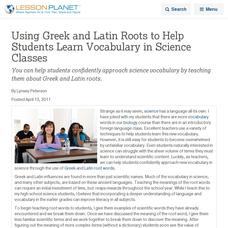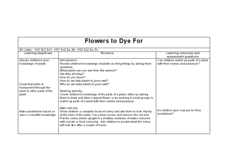Curated OER
Guided Reading Organizer for Chain Reaction
The class uses Chain Reaction, a magazine, to build a better understanding of Latin and Greek roots found in scientific vocabulary. They use two attached worksheets to help them read a scientific article, using visual clues and their...
Curated OER
Plant Power
Here is an opportunity for your first graders to take a close look at plants: what they need to survive, how they grow, and the names of each plant part. The book, Corduroy's Garden is used to open the lesson. Then, youngsters utilize...
Curated OER
Using Greek and Latin Roots to Help Students Learn Vocabulary in Science Classes
You can help students confidently approach science vocabulary by teaching them about Greek and Latin roots.
Nuffield Foundation
Nitrogen-Fixing Bacteria in Root Nodules of Leguminous Plants
Fixin' to add a great resource to your plans? Scholars perform an experiment to investigate nitrogen-fixing bacteria from plant roots. Along the way, they learn about the concepts of symbiosis and mutualism.
Curated OER
Observing Root Response After Rotating Plant Ninety Degrees
Students conduct an experiment to observe the response of maize roots when rotated 90 degrees.
Curated OER
Study of Plants
This plants PowerPoint identifies and lists the main functions of the basic parts of a plant. Each slide displays 2-4 bullet points using concise language for efficient learning. After each plant part is described, the students play a...
Curated OER
Hold on Tight!
Students explore the relationship between plant roots and the soil in which they grow. They examine photos of uprooted trees and desert areas and
conduct experiments designed to highlight this mutual relationship between roots and soil....
Curated OER
Connection to Language Arts-The Structure of Medical Terminology
In this structure of medical terminology activity, students read about Latin and Greek roots and match nine medical terms to their definitions using a table of defined prefixes, roots and suffixes.
Curated OER
Milkweed Plants
Second graders view milkweed plants (or pictures). The describe the plant and discuss ways some butterflies use it as a food source. Students view four pictures of different phases of a milkweed plant's life cycle. They discuss the...
Curated OER
Flowers to Dye For
Learners observe biology by completing a plant experiment in class. In this botany instructional activity, students discuss the anatomy related to a plant and how roots and stems are necessary to its survival. Learners utilize food...
Curated OER
The Great Cafeteria Caper
Students extract DNA from their own hair roots. They run an electrophoresis gel to examine patterns of their DNA along with standard DNA. The experiment is based on a crime scene scenario.
Curated OER
Which Way to Roots Grow?
Second graders explore roots and how they grow. They observe as seeds planted in various directions grow and record their observations. Students discuss the direction in which the roots are growing.
Curated OER
Forestry and Forestry Products
High school and college learners identify forestry career opportunities. They identify the parts of a tree cross-section and trees based on their leaves and characteristics. Pupils calculate board feet and explain safe methods of...
Curated OER
Landscape Garden Makeover
A project-based learning plan focuses on landscapes in the community. After identifying problems, such as dead trees or misplaced automatic sprinklers, learners design solutions, contact local organizations to fix the problems, and do...
Biology Junction
Macromolecules
In chemistry, organic means something contains a carbon base. A helpful presentation starts by defining macromolecules as large organic carbon molecules. Scholars answer questions about each topic on the associated worksheet. It covers...
ARKive
Plants
Here is a one-hour activity that helps learners remember the parts of plants. Not only will the class learn about plant parts, they'll also discuss seed dispersal and plant growth. A celery experiment is used to show how plants obtain...
Curated OER
Plant Systems
Second graders learn about plant systems and how plants grow and function. In this plant lesson plan, 2nd graders collect data based on roots, leaves, terrariums, plant uses, and locations of certain kinds of plants. They fill out...
Curated OER
Proof of the Primate-ive Roots of AIDS
Students explore recent breakthroughs in H.I.V. and AIDS research, as well as research various epidemics that have devastated the world population at various points in history.
Purdue University
Bio Inspired Design Paper Flowers
Can paper flowers have some of the same properties as real flowers? First, learners investigate how water is absorbed into a flower through capillary action by using real flowers, yarn, and paper. Then, they have an opportunity to create...
Curated OER
Life Cycle of Trees
Turn your students into young tree-tectives with this fun science investigation into the life of trees. To begin, a class volunteer gets dressed up in a tree costume as the different parts of trees are introduced. Then, the class...
Curated OER
Calendar Time
Use circle time to work on counting. Kindergarteners practice the months of the year, say the full date, chart the day's temperature, count to 100, and sing the alphabet song. This kind of daily routine cultivates deep roots for...
Science 4 Inquiry
Plant Structures Lab Stations
In China, hibiscus is known as the shoe flower because it is used to polish shoes, while in Hawaii, it is honored as the state flower. Young scientists learn about the structure and function of flowers. They dissect hibiscus...
California Academy of Science
The Heat is On: Cause and Effect and Climate
The higher the number of letters in the final word for the National Spelling Bee, the higher the number of people killed by venomous spiders. Obviously, those two facts correlate, but no causation exists. Scholars view data based on...
Concord Consortium
Protein Folding
Long strings of amino acids fold themselves into stable peptides. The simulation allows scholars to observe the process in multiple ways. Using hydrophobic, hydrophilic, or a combination of proteins in three different solutions, the...























